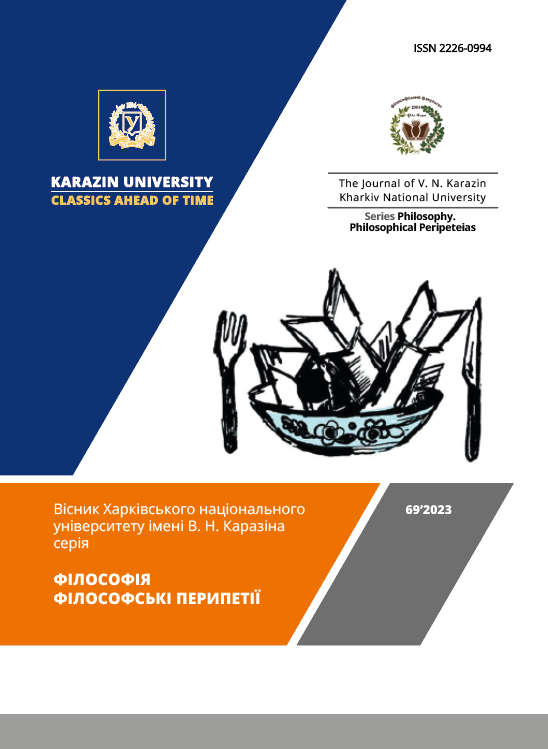ETHICS IN THE CONTEXT OF PEACE AND WAR
Abstract
The article deals with the problems of ethics in the context of peace and war. Today, during the armed aggression of the Russian Federation against Ukraine, it is especially relevant to return to ethical issues, to such concepts as justice, truth, immortality, leniency, event, loyalty to oneself, etc. The war situation forces us to rethink their meaning through open discussions that help improve the mental state of Ukrainian society and maintain hope for victory.
The authors of the article, starting from the ethical theories of A. Badiou and R. Girard, try to give an answer to today's difficult question about how to remain human during a military confrontation. According to A. Badiou, any ethical statement requires contextual applicability to the situation. Taking this into account, the philosopher develops the concept of the event, according to which the event is not so much what happens to the subject, but what the subject does in the situation - his active participation - a response to an external challenge. Next, the authors apply Rene Girard's theory of mimetic rivalry to identify the reasons for Russia's military aggression against Ukraine. One of these reasons is the non-recognition of the independence of Ukraine, the complete denial of its existence, and the identification of the Ukrainian people with the projection of enemies, in the struggle against which Russians form their identity.
At the end of their analysis, the authors come to the conclusion that if you hate and mentally eat the enemy like a cannibal, you can get a moment's pleasure from it, but such a position will never give the opportunity for a better future and true development, hatred leads only to hatred and destruction. The important tasks of ethics during war are to prevent what can injure the individual, to find a basis to help save the soul from destructive ressentiment and to remain a person who is able to evolve.
Downloads
References
Arendt, H. (2013). A Report on the Banality of Evil. Kyiv: Dukh i Litera. (In Ukrainian).
Aristotle. (2002). Nicomachean Ethics. Kyiv: Akvilon-Plus. (In Ukrainian).
Badiou, A. (2019). Ethics: An Essay on the Understanding of Evil. Kyiv: Komubook. (In Ukrainian).
Chesterton, G. K. (2020). The Everlasting Man. Lviv: Svichado. (In Ukrainian).
Datsiuk, S. (2013). The Moment of Philosophy. Kyiv: Nyka-Tsentr. (In Russian).
Defoe, D. (2018). Robinson Crusoe. Kyiv: Vyd-vo #knyholav. (In Ukrainian).
Girard, R. (1987). Things Hidden Since the Foundation of the World. US-CA: Stanford University Press. (In English).
Gumbrecht, H. U. (2013). After 1945. Latency as Origin of the Present. US-CA: Stanford University Press. (In English).
Habermas, J. (2011). Towards the Reconstruction of Historical Materialism. Kyiv: Dukh i litera. (In Ukrainian).
Hazniuk, L. (2008). Philosophical Studies of Existential-Somatic Being. Kyiv: Parapan. (In Ukrainian).
Kunnas, T. (2015). Evil: Unveiling the Essence of Evil in Literature and Art. Kyiv: Nika-Center. (In Ukrainian).
Peterson, J. B. (2021). Beyond Order :12 More Rules for Life. Kyiv: Nash format. (In Ukrainian).
Scruton, R. V. (2022). Conservatism: An Invitation to the Great Tradition. Kyiv: Nash format. (In Ukrainian).
Citations
SOCIOCULTURAL FACTORS OF THE FORMATION OF THE JUST WAR CONCEPT: FROM PAST TO PRESENT
Kovalskyi Taras (2025) Politology bulletin
Crossref
Copyright (c) 2023 Іван Толстов, Ярослав Москвін

This work is licensed under a Creative Commons Attribution 4.0 International License.
Authors who publish with this journal agree to the following terms:
- Authors retain copyright and grant the journal right of first publication of this work under the terms of a license Creative Commons Attribution License 4.0 International (CC BY 4.0).
- Authors are able to enter into separate, additional contractual arrangements for the non-exclusive distribution of the journal's published version of the work (e.g., post it to an institutional repository or publish it in a book), with an acknowledgement of its initial publication in this journal.
- Authors are permitted and encouraged to post their work online (e.g., in institutional repositories or on their website) prior to and during the submission process, as it can lead to productive exchanges, as well as earlier and greater citation of published work.






3.gif)




